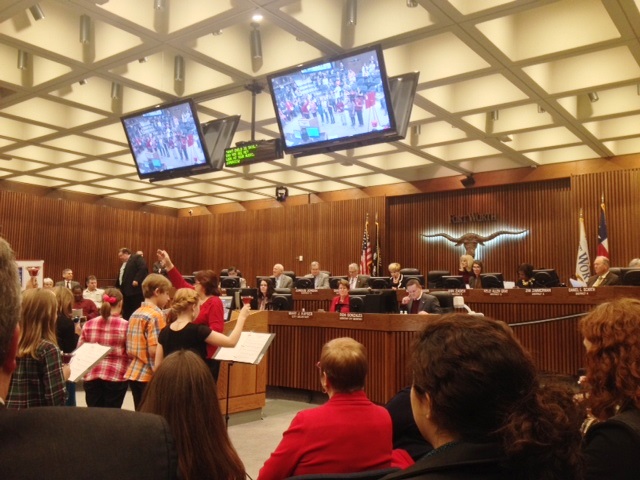This past summer, as protest groups numbering in the hundreds marched throughout Fort Worth to demand an end to police shootings of unarmed Black men and women among other reforms, Fort Worth City Hall began receiving hundreds of letters. Nearly 300 locals demanded the types of participatory city budgeting processes that other large urban cities have long enjoyed.
“I am a voter and taxpaying resident, and I am writing to urge the City of Fort Worth to give its residents the opportunity to play an active role in deciding where our taxpayer dollars are spent each year,” one letter read.
Historically, Fort Worth’s budgeting process was largely handled behind closed doors. Public comments were heard in the weeks leading up to the final city council vote, typically held in September every year. The proposed 2021 budget, $1.9 billion, was approved earlier today at City Hall.
Pamela Young, local grassroots organizer and United Fort Worth leader, said Fort Worth activists began focusing on the city’s budgeting process in January, months before the COVID-19 pandemic and killing of George Floyd brought issues of inequality and systemic racism to the national stage.
The old system of discussing the budget at city council meetings was like “talking to a brick wall because they cannot talk back to you,” Young said. “That’s not participatory budgeting. What we want is a conversation. We want to be able to ask questions and to get answers, give input and know that the input we are giving is going into deliberation.”
The letters and other communications demanded that city leaders take steps to increase public awareness of the budgeting process while creating town halls and public workshops that allow for greater government transparency and meaningful input from local tax-paying residents. City staff and elected officials responded, and every city councilmember except Dennis Shingleton (District 7) and Cary Moon (District 6) held town hall meetings throughout August that allowed constituents to ask budget-related questions or to simply give input on how city funds should be used.
During the livestream meetings, residents learned about revenue losses due to COVID-19 and other aspects of the proposed budget. A spokesperson with the city’s budget office said that revenue losses have been lower than expected. After an initial estimated $23 million shortfall, the current annual loss is $16.2 million, partly due to “better than expected” sales tax earnings.
“The biggest cut is tied to personnel, and it was approached in two different ways,” the budget office spokesperson said, describing steps that city leaders have taken to shore up COVID-related losses. “Departments were asked to review low priority programming and associated positions. As a result, 80 authorized positions were eliminated, [and] opportunities for incumbents to find employment in other areas of the city were found. A hiring freeze was implemented almost immediately.”
Property and sales taxes account for the vast majority of the general fund budget. The city’s executive summary of the current budget states the top goals were to re-envision policing services by emphasizing community programs, strengthen oversight of Fort Worth police department, increase funding for capital projects like street repairs and parks, and to prepare for future “financial strains resulting from COVID-19.”
Under the current proposal, property taxes will be divided accordingly: 48% to the Fort Worth school district, 10% to Tarrant County, 9.6% to the Hospital District, 5.6% to the Tarrant County Community College District, 1.2% to the Tarrant Regional Water District, and 25.6% to Fort Worth. Possibly the most significant changes are to the Crime Control and Prevention District (CCPD), the sales tax-funded district that adds more than $78 million to police coffers each year. This past July, the district was renewed for 10 years after a heated vote that was marked by vocal opposition for and against the program.
One month after the vote, Police Chief Ed Kraus presented a wide range of reforms to the CCPD that are now part of the proposed budget. The proposed 2021 CCPD budget is $86.5 million. A new 10-member Community Service Professional Program will respond to non-emergency calls “such as helping stranded motorists, animal-related issues, and calls where no suspect is on the scene,” according to the city.
The proposed budget increases CCPD community program spending by $2 million (to $7.1 million) while reducing the budget for police militarization by $7.5 million. The new CCPD budget also includes funds for an expanded Mental Health Crisis Intervention Team. The intervention program allows mental health professionals to take the lead on calls involving persons experiencing a mental health crisis.
“The city had taken steps to increase funding to the community-based programming, which provides grants to community partners,” the budget office spokesperson said. “Having said that, the budget is a process that must be completed in a timely manner. We would encourage citizens to be involved year-round. The CCPD board holds quarterly meetings.”
Activist Young said the steps take police spending in the right direction and away from situations where armed officers are less likely to break apart families by arresting or killing members of the Black community.
“Take that money away from these putative forces that decimate our community and put it into things that rebuild our community that has been decimated by white supremacy and institutionalized racism,” she said.
The spokesperson for the city said 2022 will likely “be a more challenging year, with the COVID impacts being reflected in the property tax more fully during this year.”
Tarrant County Republican Party did not respond to a request for comment on the budgeting process.












